It is now nearly fourvyears since I ran my first Marathon. I am not going to lie about it: it was a complete disaster. I’ve followed a strict training plan and stuck to the rules. But it did not help.
But I learned from my mistakes. I completed some more Marathons and Ultra Marathons since, and here are my top 5 things that I wish I’d known back then.
1 month to go until your first Marathon: run less, stretch and strength train more
When I signed up for my first Marathon I was really excited. I had run a few Half Marathons before, and thought I knew the game. I followed a strict training plan. And when I had time to spare I would go for an additional run instead of doing my running drills and strength training. More is more I thought.
Three weeks before the race I injured my IT band on a 5 km run. It was a slow “recovery” run after my long run. But it was just too much.
I spent the next three weeks trying to get rid of my injury. On Marathon day it was fine the first 25 km, but I could only limp the last 10 km. I barely made it to a sub 5 hour finish. These were the most painful two hours of my life.
When I looked back at my training log for my first Marathon I realized it was completely imbalanced. I had done too much running too soon without having a proper base and without incorporating enough strength training and stretching. A poor and unbalanced running posture then aggravated the problem.
I have since then changed my training plan completely. I do quite a lot of HIIT strength training, functional training and stretching sessions now. They make up around 50% of my regular training volume. I now know that they are crucial for injury prevention, making me stronger and faster long term.
Take a step back and reevaluate
So before you go out there for another run, thinking more is more, take a step back and reevaluate.
Have you really done your homework? Do you have a strong base for your running volume? Or are you ignoring your the strength training? Only stretching for 2 minutes after a run?
For most of us the answer will be that we are not strength training and stretching enough. Don’t get me wrong, cross training like cycling and swimming will also help your endurance, but it can never make up for the stability and mobility that you get from strength training and stretching.
What you can do:
Maybe you want to take a yoga or pilates class once a week, join a local boot camp, stretch for 15 minutes after each run, or use a bodyweight training app to get you fit. No matter what you do, it will benefit your running.
And being less perfectly prepared (read: ran less miles) but non-injured at the start is always better than having followed a plan (read: ran lots of miles) but being injured on race day.

1 week to go until your first Marathon: make friends with pre-race anxiety
I have now run 30+ races, and I still suffer from pre-race anxiety. I had hoped it would get away over time, but it did not. However I now understand better, how I will react the days and hours leading up to the race and I know what to do.
Pre-race anxiety will be different for everyone, but my most common symptoms are:
1) negative self talk
I will always say “I can’t do this” “I have not trained enough.” “The distance is too long/the goal pace is too fast/the obstacles are too hard” or any other versions of this. My friends then always bring me back to reality and remind me that I’ve said that all the times before and I still made it every time so far.
My friend Gemma wrote me an amazing and encouraging message before I flew out to do my marathon double earlier that year, and I now read it every time I have self doubts.
I highly encourage you getting one for yourself.
2) phantom injuries
During the days leading up to the race I would suddenly get minor injuries. Nothing major, but something to make me nervous. I now know that I have these “injuries” also during my normal training cycle, but I don’t give them any attention. In the week before a race however, I will notice them and freak out.
So I now try to actively plan tons of extra rest time into my week before a race just to give my body extra TLC. I foam roll, massage and ice my phantom injuries. This also calms my mind as I am actively doing something.
And then come race day, they will magically disappear thanks to my protocol and some extra adrenaline and endorphins in my blood stream.
However, it is very important to distinguish between a real and a phantom injury. Real injuries will haunt you during the race and you should definitely take them seriously.
3) sleeplessness
I can’t remember a race where I had a good night of sleep before. I probably average 4 hours before a race. Most of the time I travel to races, will be jet lagged and sleeping in a crappy hotel bed. Not a good combo for good sleep. But even in my own bed I can barely sleep.
So instead of freaking out that I am really tired and did not get enough sleep I now plan ahead and try to sleep more the two nights before the last night leading up to a race.
4 hours to go until your first Marathon: coffee and Imodium
This is probably the ugliest topic to talk about, but also a very important one. It is about tummy issues, stomach bugs, race diarrhea or just “how not to sh*t you pants during a race”.
If you are a newbie to running and this is your first Marathon you might have not seen it yet, but it happens quite often at races. There are runners on the course that sh*t their pants. And I am always scared that I will be this person one day.
But it turns out that the urge to go to the toilet and poop before or during a race is nothing rare, it is actually completely normal and a lot of people suffer from it.
Why? There are two main causes:
1) pre-race anxiety or nervousness
It is absolutely normal for our body to do this when we go into fight or flight mode. It something still coming from out old caveman times, protecting and preparing us for an important fight ahead.
If you ever get tummy issues when you are nervous, for example before exam, or before you have to give a public speech or get up on stage, it will be likely that you will have the same issue before running a marathon.
2) normal bowel movement
When we run our bowels move quite around a bit, and this will activate your digestive system, speeding up the process of digesting.
I am sure you can guess the result. So what can you do about that?
The solution is actually quite simple.
Step 1) As soon as you get up on race day have a hot drink, preferably coffee. Afterwards, have something small to eat. Then have another hot drink.
The intake of food will trigger a natural reaction in your body which is called the gastrocolic reflex. It basically makes your body “make room for more food”, aka the need for a toilet break. It is very commonly found in babies and children, but also we adults have it. And yes, coffee enhances the effect.
Plus, it gives you an extra caffeine boost.
The coffee will work as a slight diuretic, so make sure you plan frequent porta-potty stops before the race.
Step 2) Take one or two Imodium (or other generic drug with the active ingredients loperamide hydrochloride) around one hour before the race. This should stop bowel movements for the next half day, and therefore reducing the porta-potty stops during the race. Disclaimer: Always check with your doctor before taking medication!
So now you know my secret pre race strategy. Imodium is pretty much the only drug I take before the race. I could maybe do without, but I do not want to risk it.
1 hour to go until your first Marathon: dress up
The start line at a Marathon can be a very boring place. You have to be there hours before the start. Then you wait. And then you slowly move your way forward once the race started. And this does not count any delays.
It happened to me several times that I had to wait over an hour in the start corral until I crossed the start line. Especially when it is freezing cold, this can be devastating to you Marathon.
So now I make sure I come prepared. I will wear layers of old clothing to keep me warm. Old track pants, leggings, t-shirts and sweaters are great for that. Old bathrobes and woolen hats and scarves are also very useful.
Start saving them or ask friends and family long before the race. And don’t worry about tossing them right before the start. Usually they get collected by charities and will therefore go to a good cause.
Then I always wear two black bin liners or garbage bags. One as a skirt and one as a top. They protect me from the rain and wind and therefore keep me extra warm.
Trust me, they are the most envied accessory at the start line.
I then will bring a water bottle, some food, and maybe something to sit down on like and old pillow or blanket.
ust before the official start I do a quick warm up. Running on the spot, squatting, circling my ankles and knees. First I will then take off my bottom layers, but the top layers only come off once I am walking/running towards the start line.
I have once taken off everything too soon, with the start being then delayed a few minutes. I was shivering heavily, and continued over the first 3km. This can completely mess up your running rhythm, so keeping yourself warm at the start has a high priority. It will also make you wear less for the race itself, so you are not overheating later on.
And don’t worry about the looks. You are running a Marathon, not walking the catwalk.
On the run: suck up the pain
Let’s face the truth: running a Marathon is painful. No matter how hard you trained for your first Marathon, or how prepared you are, it will hurt. A LOT.
42 km or 26 miles is just a very long distance for your body.
I have never met anyone, no matter what fitness level, that crossed the finish line saying: “That was great. I feel amazing. Let’s do it again”. More likely you will see people limping in pain after the finish line (after they fakes the smile for the finish line photo of course).
The same people are usually the ones at the start bragging about how great they feel.
Trust me, that feeling is fake. You will be running on adrenaline and endorphins for the first 10 km. You will be overly excited and going way too fast. Sooner or later you will hit reality with pain in your joints and muscle exhaustion, maybe even hitting the wall in severe glucose depletion.
Half way at a Marathon is 30 km. That is when it will get really ugly. But you will not know how ugly it can get before you experienced it running a Marathon. And even then, it can always get uglier. Heartbreak hill in Boston Marathon? The 14 bridges in the last 2 km of Venice Marathon? Pain will be completely redefined during the last 2 miles.
So how do you prepare for this?
Physically there is one thing that helps to simulate the fatigue. Just do your long run. Do at least one long run of 32 km, or the time you want to go in your Marathon, but make sure you don’t injure yourself. If you have time, take it up to 36 km.

But what is much more important is your mental strength. Once you are in the pain cave, you have to suck it up. You have to push through. You have to finish. (Speaking about the normal Marathon pain. If you are really seriously injured, you should if course opt out)
So when you are running your first Marathon try to be pessimistic at the start. Don’t fall for the endorphin rush and go out too fast. Don’t try to bunk time in the beginning. Try to save energy. Tell yourself there is still a looooong way to go and it will get harder the closer you get to the finish line.
After 10 km you should feel at 90% of your energy levels, after 21 km at 75% and after 30 km at around 50%.
Once you hit the red zone of 30 km plus you need to start with some motivating self talk. “I can do this” “I still have energy” “I will finish” together with your favorite running playlist can work miracles.
Once you arrive at 40 km it is okay to have only little left in your tank. The thought of the finish line and the cheering crowds will keep you going. Stop thinking and then just put one foot in front of the other.
When you are at 42 km it is time to pull yourself together. Run tall and smile for your last 200m. There are cameras everywhere, family and friends watching.
Fake your smile now, you can cry after the finish line later. The post-marathon beer and burger will be worth it.
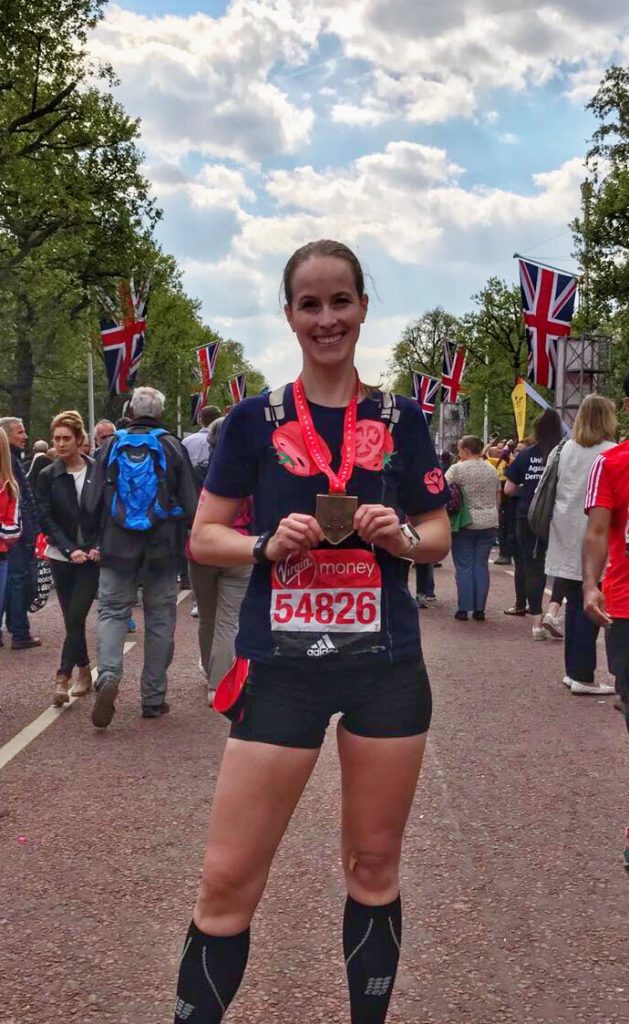
Do you want to run a Marathon yourself? Check out my blog post on the best Marathon gear, and pacing strategy.

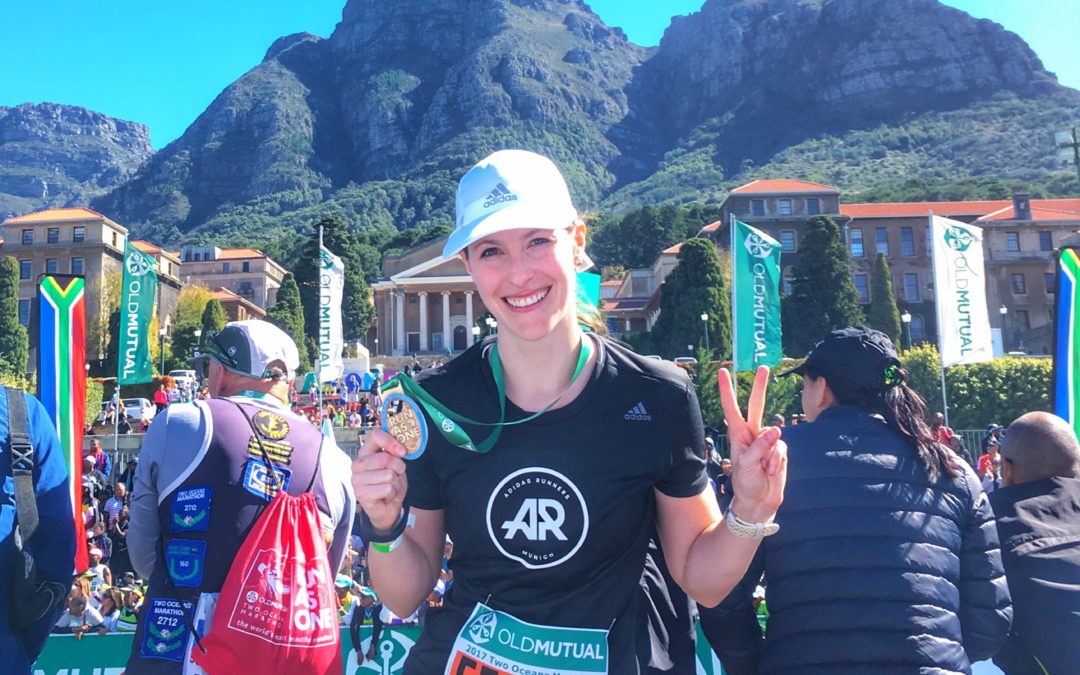
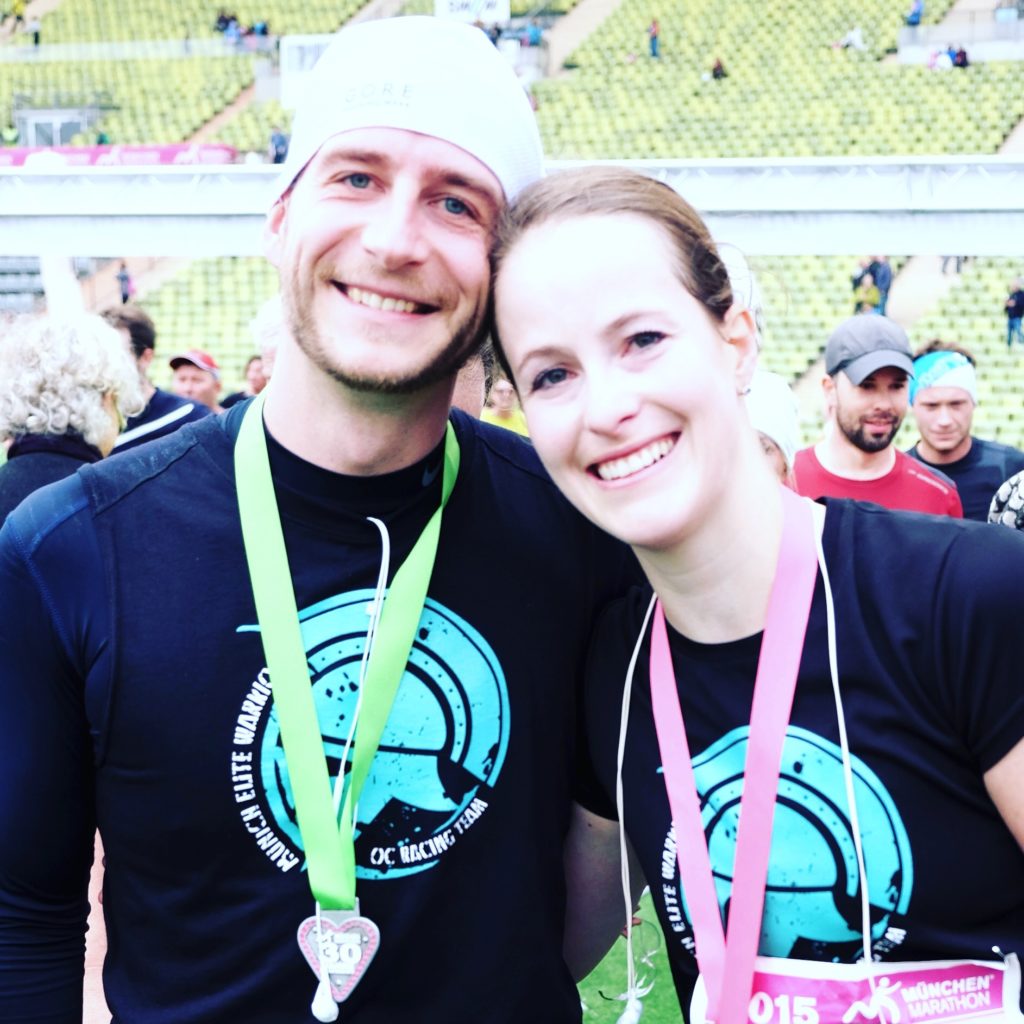


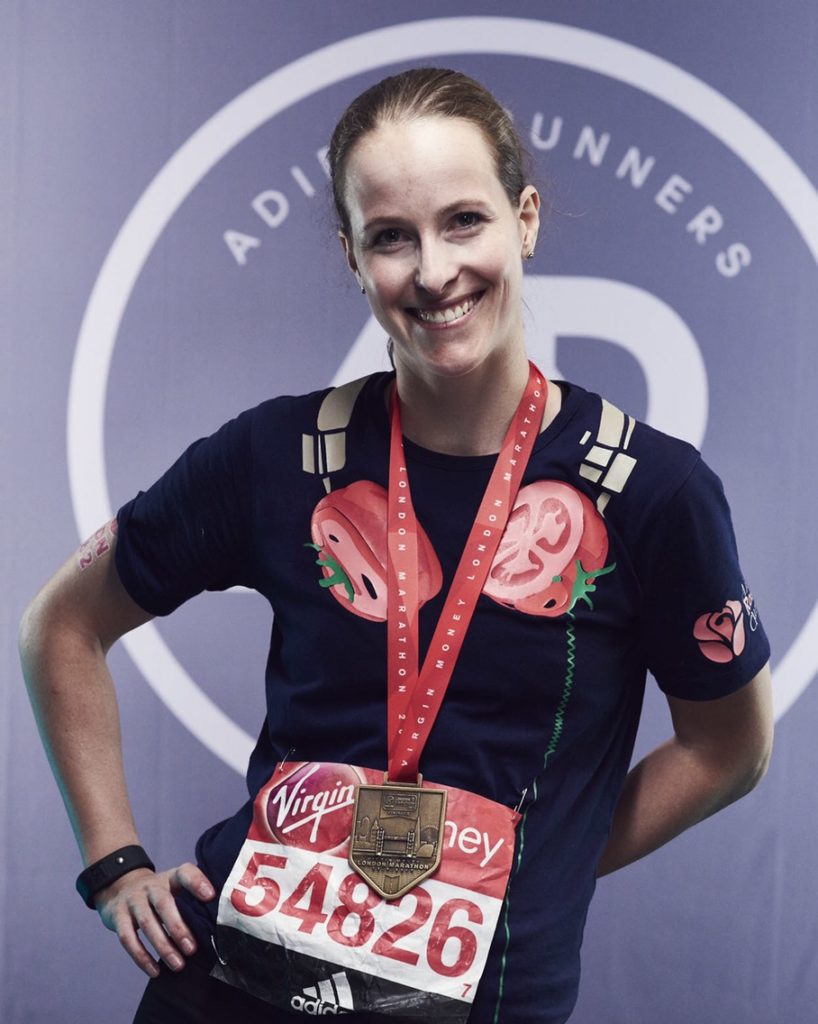
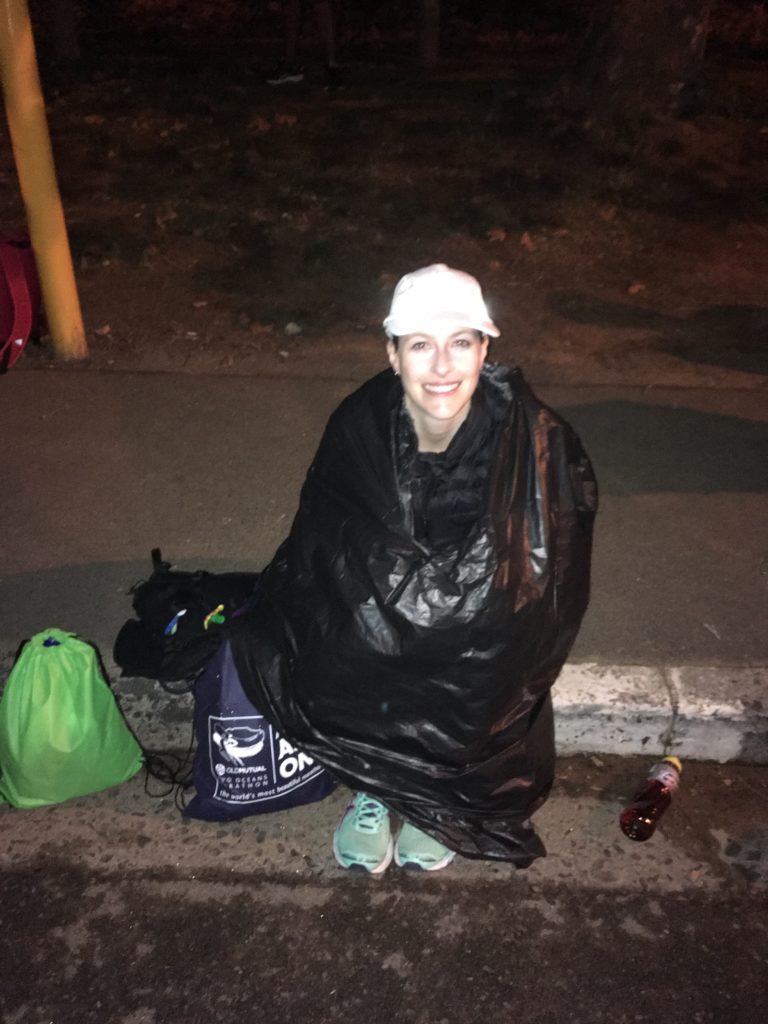

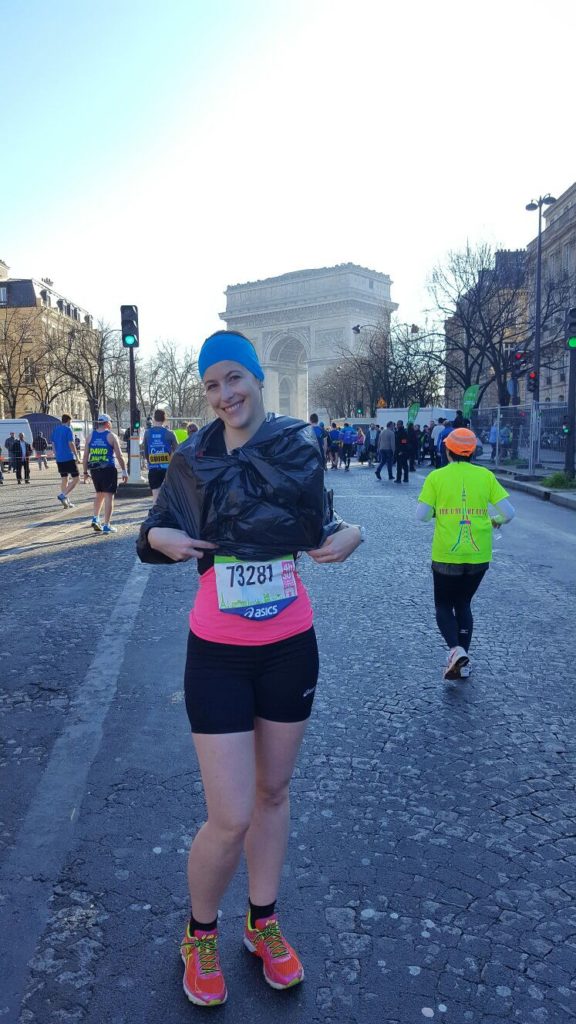


Hi Carola, thanks for the insite into running long distance. This will really help when I attempt my first next year… Keep up the great work.😀
Thanks Blair! Now I know who my regular Australian readers are. 🙂
Oh gosh I’m scared.
No need to be scared! You know everything you need to know. You will super fit and fast and mentally strong. You can totally do it!!!